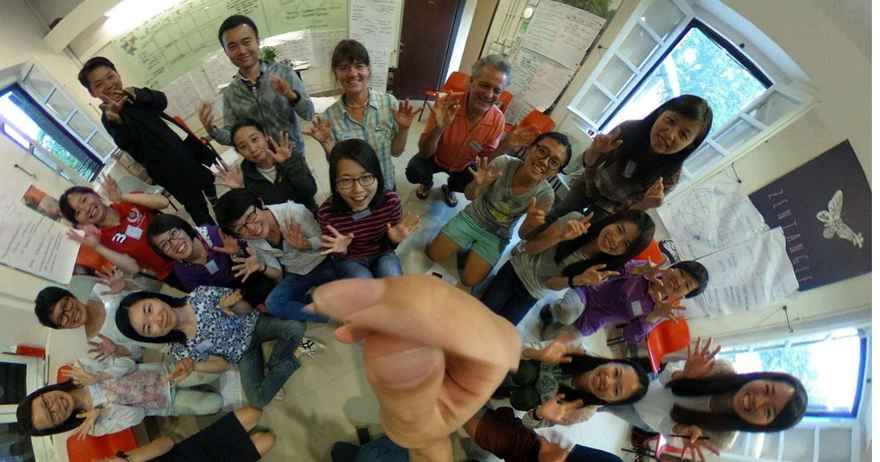Learning in times of rapid and uncertain change

In these fast changing times, our skills and abilities as a species, as citizens, and as individuals will be tested as never before. We need to build on success and discard the unworkable. We need to discover the thus far elusive ways through our inability to respond politically and economically, and maybe even spiritually, to the global challenges we face. For this we need an education that will enable us, particularly our young, to work effectively, collaboratively and creatively to solve seemingly intractable problems.
We are great as species at finding new and imaginative ways of meeting life’s problems and learning from each other. It is arguably Homo Sapiens most successful characteristic.
Sustainable Development Goal (SDG) 4 places education as one of the keys to creating a regenerative culture. SDG 4.7 defines education for sustainability. However, the fundamental elements of this key Sustainable Development Goal have remained elusive and ill-defined. SDG 4.7 presents educators with a dilemma. How do you define what we need to educate people for, if we do not yet know what a sustainable or regenerative world looks like? And perhaps even more importantly at this time, how to we get from where we are now to something sustainable? Another question that arises is, ‘What is the unique skill set of Education for Sustainable Development (ESD), and how are they different from a good education?’
The approach to these problems defined our research project, and the result is: A Competency
Framework to Assess and Activate Education for Sustainable Development: Addressing the UN Sustainable Development Goals 4.7 Challenge. The full article is available in the open source journal Sustainability here. We took as given, good overall education skills like numeracy, literacy, etc. There are obviously many skills and competencies that specific sectors need but which do not carry over into others. For instance, a land management course will require knowledge of soil chemistry and biota. However, zero carbon, zero waste building would not. We also did not focus on those sector-specific skills. We focussed on the meta-skills or ‘key competencies’ of SDG 4.7.
We drew on the existing literature of ESD and considered our own experiences of education in this field. One of the main additional skill sets we included in our key competency framework was intrapersonal skills. This is the ability to ‘know yourself’, with skills such as presencing, awareness of and ability to articulate and use your internal states to engage with problems or others. We have seen the importance of inner awareness in this field in many ways and many times. Dr Stephen Stirling suggests the importance of second-order learning – where the learner’s worldview, values, and personal ways of knowing are challenged and changed accordingly. (first order learning is learning a defined and known set of skills ) Dr Stirling draws on Gregory Bateson’s work to propose third order learning- ‘which challenges the paradigm within which learning is taking place with a view to altering the learner’s worldview’. Some might terms this a shift in consciousness. We felt all of this as important for ESD.
The key competencies we identified are:
Intrapersonal – knowing yourself and your inner landscape.
Interpersonal – the ability to work well with others.
Future thinking -planning for and envisioning multiple futures
System thinking- the ability to see life as a series of complex systems and knowing how to work with that complexity
Disciplinary and interdisciplinary- working across traditional knowledge boundaries
Normative and cultural – how to work with vales and integrate that in any work.
Strategic- the ability to plan in order to create solutions
Having defined the key competencies for SDG 4.7, we then created a light touch, simple to use evaluation framework. We created a subjective evaluation method which is designed to be flexible enough to be used in a variety of educational settings, but which can be repurposed, into something more quantitative and critically, is iterative. This means that by using this evaluation framework, a teacher or institution can learn what is currently not strong enough in their curriculum, what might need to be added, and also what is currently working. Our intention is to make the evaluation process learning in itself, and enable a learner or teacher or facilitator to self reflect on their work.
Our next steps with this work are to do more testing and rapid development of both the educational framework and the evaluation method. We all need to re-skill ourselves for a world that is being birthed and is not yet born. We all need to be able to meet the challenges of the coming decades whatever they are and in their full real-world messiness and complexity. Our key competencies framework will enable us to work with and meet these challenges in the years to come.
Our free #Glocalisers webinar with Naresh Giangrande on 25 October will be a chance to peer into the complexity of a world that does not yet exist and glimpse the possibility (or impossibility) of equipping ourselves for this world. You will be challenged to look beyond your’ knowns’ to the unknowable unknowns. We will also share some of our findings about how we have applied education for unknowable unknown to educational settings, and how, in turn, we can start to evaluate whether specific educational settings are enabling learners to acquire these key competencies.
Co-founder of Transition Town Totnes, the first Transition Town, and of Transition Training, Naresh Giangrande has been involved in designing, running and evolving many of the events, groups, and trainings that have been at the heart of the enormously successful Transition Towns movement. As one of the initiators, he has delivered hundreds of Transition Trainings to thousands of participants in twenty countries that has lead to a local project in South West England becoming a world wide movement in over 50 countries.



0 comments
Leave a comment